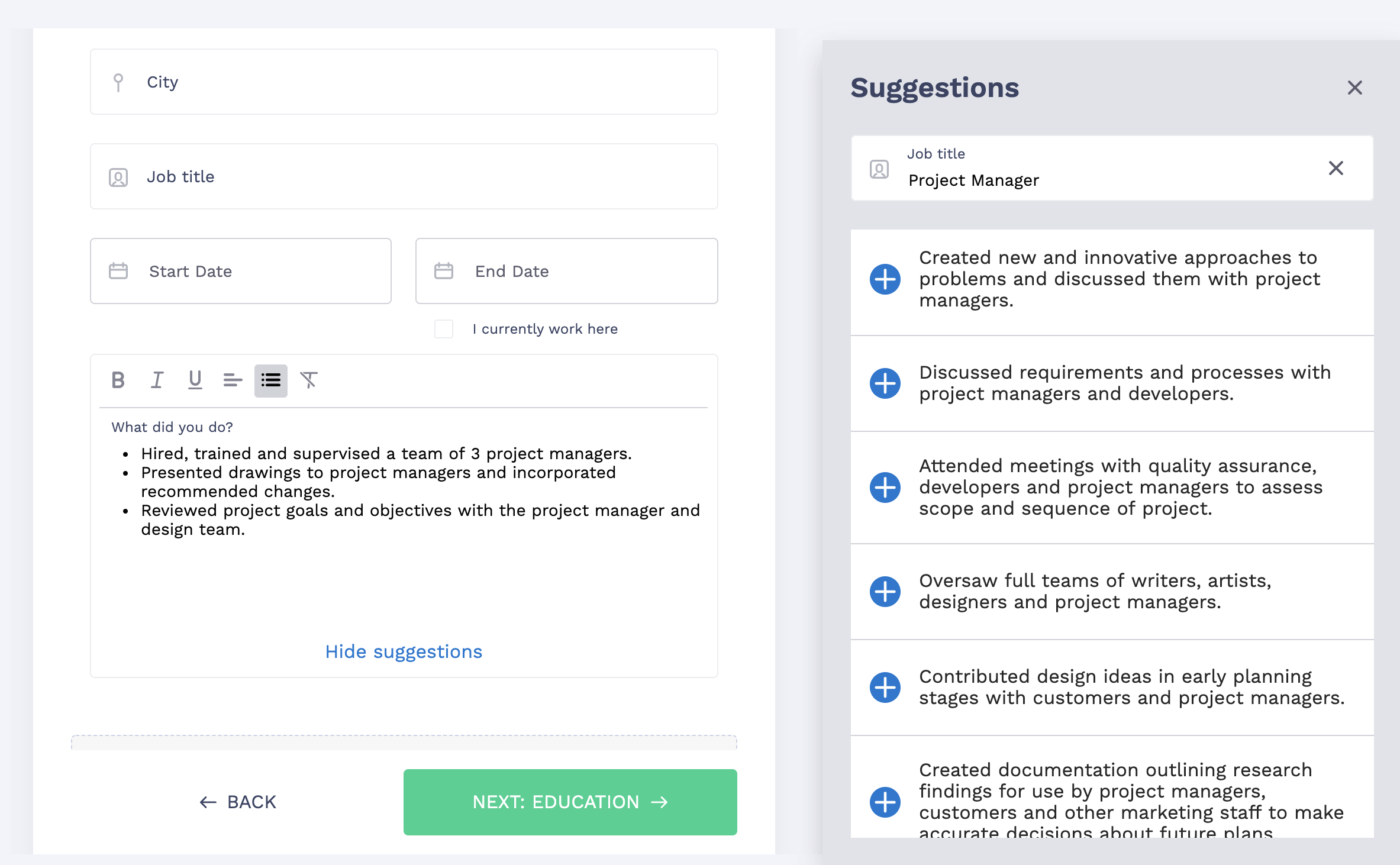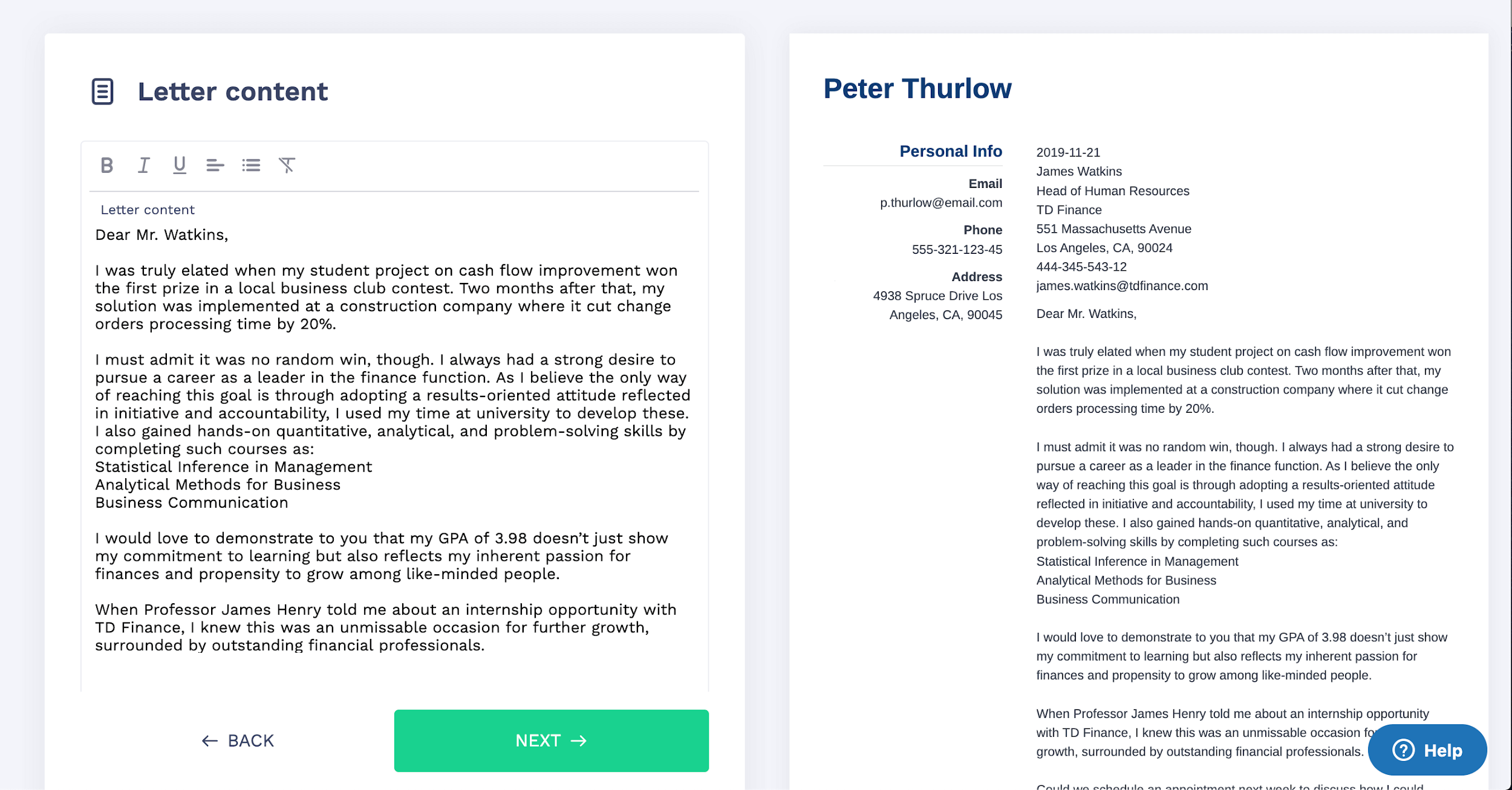Let’s face the facts:
On a day like this 1.56 billion active users will log onto Facebook, 1 in 5 young adults will use Twitter, and the average Instagramer will spend over 50 minutes on the app.
If you think they do it in their spare time, well, you are wrong.
If you think social media is a productivity killer that drains your teams’ performance, you are only partially right.
If you put a brick wall between employees and social networks, you might shoot yourself in the foot.
What if instead of blocking social media in the workplace (like more than half of US companies do), you could use them to your advantage?
Here’s how to do it right.
Create my resume now

Create a job-winning resume with little effort. Hack your way through ATS software with our 18 beautiful templates—give our builder a try!
Benefits of Social Media in the Workplace
Social media can be a powerful tool for employees. Let’s see how to utilize its various channels.
1. Boosts Your Employees’ Productivity
Here’s the thing:
One of the core assumptions behind social media use in the workplace is that it dents staffers' productivity.
In a way, that’s true. Most employees spend at least 1.5 hours a day on social media sites, regardless of company policy.
They scroll through their Instagram feed, check memes, and see what their friends are up to.
To put it into perspective, that’s 7.5 hours a week and 31.5 hours a month of wasted time.
Is it really wasted, though?
The relationship between social media and productivity in the workplace isn’t that straightforward.
Research shows that employees are at least 9% more efficient when allowed to browse social media sites at leisure.
In addition, more than half of highly successful people (over 55% of men and nearly 49% of women) engage in social media use in the workplace for entertainment, not work.

How come?!
Well, it’s hard to be laser-focused for eight hours straight.
We all need some downtime—even if it means scrolling mindlessly through feeds.
According to Psychology Today, social media breaks can prevent decision fatigue that wears down employees’ reasoning and willpower.
So—as counter-intuitive as it might sound, social media can actually increase productivity in the workplace.
2. Keeps Employees Engaged
Picture this:
You have the best talent on board. They’re reliable, committed, and fit into your company's culture.
But—
The spark is gone. Some drag their feet to work, and others' performance has nosedived.
Problem?
Your employees are part of a gut-wrenching 68% of disengaged workers in the US.
Well, the good news is—
If you allow them to use social media in the workplace in short bursts, it can resuscitate morale and improve company-wide engagement.
Why? Because workplace social media usage:
- Helps keep up with industry trends. Workers stay abreast of the industry, learn about new developments, and can ultimately create more value for the business. As a result, employee satisfaction levels rise.
- Connect with fellow thought leaders. Employees get to chat with people in similar job functions or areas of expertise. That allows for a variety of engagement benefits from brainstorming, to improved collaboration, to knowledge transfer.
- Interact with individuals from within the network. Social media paves the way for better internal communication and hence increased trust between employees and the company, all of which are vital for engagement.
Keeping your staff glowing might seem like a complex task. But if used right, social media can help supercharge your teams and boost the way employees feel, grow, and work.
3. Helps Tackle Work-Related Issues
Social media is a network. Use it as a tool to help you solve work-related problems specifically.
In this instance, employees will post questions, crowdsource opinions, or read about industry trends—most likely via Twitter, Facebook, and LinkedIn, rather than on Instagram or Reddit.
And the numbers prove it:
Research shows that 60% of employees believe social media supports decision-making processes.
Another 56% of workers believe that using social media ultimately helps their job performance.
The only problem is—
Employees using social media at work for business rather than entertainment are also likely to switch companies if they come across a solid opportunity.
In fact, 78% of workers believe social media is useful for networking or finding new job opportunities.
Makes sense, doesn’t it?
Connecting with industry leaders boosts your subject matter expertise but it also means you meet people who might, at some point, let you know about a dream opening.
Good news?
You can flatline that risk with certain turnover-prevention initiatives (stick around to learn more.)
4. Strengthens Professional Relations at Work
Would you like to enjoy more cohesive teams and improve productivity?
If you permit the appropriate use of social media in the workplace and let employees interact with each other online, it'll be a reality.
Need proof?
Based on David Maxfield (co-author of Crucial Conversations) and Mike Rognlien’s (learning and development manager at Facebook) recent report, social media helps build better relationships in the workplace.
Let’s look at some social media in the workplace statistics:
According to a recent survey, 68% of employees are connected with coworkers on social media.
That makes social media the ultimate avenue to create a sense of community, encourage communication between employees, and facilitate idea-sharing.
Why is it important?
Because relationships make or break successful teams.
At the heart of every high-performing team, there are people and the magic they create when they work together.
If employees can work in concert with someone they can trust, they'll spend every ounce of their energy to deliver a better product.
5. Improves Your Branding and Talent Acquisition
Here’s the thing:
Companies spend an average of 35% (or $75,000/year) of the budget on marketing campaigns.
Well—
If you engage employees to share company content on social media, it might result in 5x more traffic and 25% more leads.
Let me explain:
Word-of-mouth is one of the most effective marketing tactics that influences 83% of purchasing decisions.
In today’s digitalized world, most word-of-mouth takes the form of Facebook recommendations, tweets, Instagram stories, and other social avenues.
The rationale being that people have much more trust in whatever their friends or colleagues share.
Result?
The content shared by employees gets an average 8x times more engagement and re-shared 25x times more often compared to the content shared by brand channels.
Think of the impact this has on your revenue.
Not to mention, social media seamlessly gathers together a network at your fingertips, gifting your talent acquisition team with a great tool for recruitment.
Let’s say you’re a 50-employee company and each employee has around 100 connections on LinkedIn (fairly average number.)
So—if you encourage existing staff members to share updates about new openings, it’ll help you reach ~5000 potential hires without lifting a finger.
On top of it, you won’t have to bear exorbitant costs associated with career search sites and recruiting agencies.
The ResumeLab builder is more than looks. Get specific content to boost your chances of getting the job. Add job descriptions, bullet points, and skills. Easy. Improve your resume in our resume builder now.
CREATE YOUR RESUME NOW

Nail it all with a splash of color, choose a clean font, and highlight your skills in just a few clicks. You're the perfect candidate, and we'll prove it. Use our resume builder now.
Negative Effects of Employees Using Social Media in the Workplace
Social networks and the workplace.
What can go wrong? Plenty.
1. Increased Turnover Rate
Nightmare scenario.
You put down the ban to use social media at work. A few weeks later, your inbox is chock-full with resignation letters.
Argh.
Unfortunately, this can be a reality.
Based on Lorenzo Bizzi’s study, 76% of employees who use social media for work (and 60% of staff using social media for leisure) are more likely to call it quits.
That's one of the critical problems with social media in the workplace.

Why?
Bizzi suggests that when employees go on social media sites, they might research new organizations, engage with potential employers, and build up their network.
Now—
That presents a major problem.
On the one hand, employees that use social media in the workplace are more engaged and productive. On the other hand, they have a higher chance of leaving.
That throws the benefits of using social media at work atop a blazing fire.
But wait—cutting social media time at work doesn’t mean employees won’t engage with potential employers on their down time. You always run the risk of employees leaving your company to go on to greener pastures.
Good news?
All is not lost. In fact, there are several ways to keep employees onboard.
First, Bizzi recommends you introduce training that helps employees focus on the positive social media traits such as collaboration and public recognition.
For example, you can set up a Facebook group where employees collaborate to solve issues and clear roadblocks.
Another way to turn the threat into opportunity is to engage in recognition and spotlight employees' wins on social media.
It’s what St. Louis Children’s hospital often does and it works great—public recognition is extremely powerful.
It empowers employees to become more positive, productive, and innovative to gain even more recognition and climb higher up the leaderboard.

As an added benefit, this approach might boost brand awareness and attract solid, passive candidates.
2. Wasted time
Now—
While the benefits of using social media at work are plentiful, one of the cons of social media in the workplace is that some employees might abuse it.
Why?
It’s just all too easy to get sucked into the endless vortex of memes and photo captions.
In fact, a staggering 70% of companies took disciplinary action against employees for social media misuse.
Examples include misuse of sensitive information, inappropriate non-business use, and disparaging remarks about the business or employees.
As a result, productivity might drop off a cliff.
Good news—
You can flip things around and introduce a social media policy for employees.
In it, you can spell out what’s allowed and what isn’t when employees go on social media on the job.
Here are three rapid-fire tips to make your social media policy in the workplace rock-solid:
- Add specifics. List employees social media rights and state what behaviors violate the policy (e.g., engage with potential employers, apply for jobs.)
- Restrict undesired behavior. Forbid employees from disclosing sensitive company information and posting anything that offends other employees in any way (e.g photos of upcoming product releases, venting about workplace frustrations.)
- Educate employees about social media policies in the workplace. Make sure employees are aware of the policy and how it affects their social media use at work (e.g., require employee signatures.)
If you set your best foot forward to design a robust policy, it’ll help you mitigate the risk of social media abuse in the workplace and enjoy an abundance of perks that come with it.
Double your impact with a matching resume and cover letter combo. Use our cover letter builder and make your application documents pop out.
CREATE YOUR COVER LETTER NOW

Want to try a different look? There’s 18 more. A single click will give your document a total makeover. Pick a cover letter template here.
So—What Do You Think?
There you have it.
A whopping five social media benefits in the workplace + how to tackle the potential downsides that might creep in.
Now—
Do you let employees go on social media at work? Does it make employees more productive or you think it hampers teams’ performance?
Let me know in the comments. I’d love to chat!


![Social Media in the Workplace: Drawing the Line [Guide]](https://cdn-images.resumelab.com/pages/social_media_in_the_workplace_hero.jpg)









